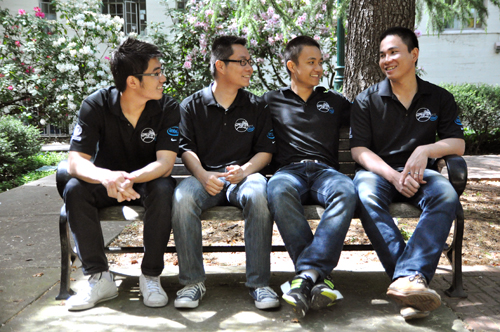On May 5, four Portland State electrical engineering seniors—Hung Minh Nguyen, Hoa Van Nguyen, Anh Viet Ngo and Thang Duy Vo—won the top prize at the Cornell Cup USA, a national embedded-system design competition at Disney World in Orlando, Fla. They competed against 22 other teams, including the Massachusetts Institute of Technology and University of California, Berkeley, among others.
Intel Vietnam Scholars Program students win national prize for design
On May 5, four Portland State electrical engineering seniors—Hung Minh Nguyen, Hoa Van Nguyen, Anh Viet Ngo and Thang Duy Vo—won the top prize at the Cornell Cup USA, a national embedded-system design competition at Disney World in Orlando, Fla. They competed against 22 other teams, including the Massachusetts Institute of Technology and University of California, Berkeley, among others.

The team developed a prescription drug identification program that provides drug information from online or built-in databases. A camera or a barcode identifies the drug and, if unable to identify, the user can then manually type in markings on the drug into the database to help identify it. The device needed 95 percent accuracy when researching drug information, and the team used actual drug samples during testing.
Electrical and Computer Engineering Assistant Professor Mark Faust and Professor Marek Perkowski helped prepare the team while Faust led them to Florida for the competition. “It was great seeing the recognition for their hard work,” Faust said, regarding the award. “They not only had a great project that was well executed, but early on they established real success criteria,” he added.
Faust previously taught all four students in a capstone course, where they learned about real-world product development, which includes learning needs and objectives, test plans, project scheduling and more. Faust also taught several of them in computer architecture and microprocessor system design classes.
“They’re a rare combination of intelligent, extremely hard working, ambitious and tenacious. They demonstrated throughout the project that they’re willing to get to extra lengths to make it right,” Faust said.
“There’s a fairly sophisticated camera subsystem and image feature for color, shape, size and imprint. The project uses three databases containing information about more than 16,000 prescription drugs,” Faust said. “After a successful match it queries both an offline database and an online database, if there’s a network connection, to provide detailed information on dosage, contraindications, side effects, etc. It’s capable of updating its offline database remotely over the web,” Faust added.
All four students attend PSU through the Intel Vietnam Scholars Program, which brings Vietnamese students to the university. “This was a chance for me to study abroad and gain experience before coming home. Although it has not offered me everything, I have learned several things in the U.S., including how to be a good engineer,” Hoa said.
Hoa’s project duties included image processing and training the machine to recognize pills, shapes and colors, and he spent more than six months working on the project. Hoa enjoys engineering, saying he wants to still be an engineer 10 years from now. “It’s fun to be an engineer,” he said. “I want to work with problems and solve them.”
Vo’s role was to engineer a mechanical system, calibrate the lighting system, and design a suitable background that the drugs can lie on while the machine reads them. Vo has been interested in electronics since he was a child and feels like he has evolved by studying through the IVS program. “I think it changed my life a lot. I have had a chance to study in the U.S. for two years and I learned many, many good things about technology, working methodologies, working culture and so on,” Vo said.
Ngo’s role involved the image-processing module. “The whole team spent about seven months to design, implement and test the device,” he said. “The scope of the project is large enough to challenge the team, especially when we did not have any experience in image-processing before. However, we overcame it and had fun working together,” Ngo added.
Ngo also enjoys programming and building circuits. He wants to be an engineer because he believes that engineering builds an innovative application that leads to a better life. Ngo also feels he learned greatly from participating in IVS. “It’s a great program where Vietnamese students have the chance to experience U.S. education and the multicultural environment. These experiences will be very helpful to us in our careers with Intel after,” Ngo said.
Hung was the leader of the project and participated in every part of it. However, Hung mainly worked with the databases, external hardware, project planning and graphical user interface. Hung is interested in robotics and programming. In Vietnam, he studied automatic control engineering until he switched to electrical engineering when he enrolled at PSU. “IVS is a great program that provides us not only an education in the U.S., but also chances to get involved in U.S. culture and Intel culture, which are really important to us in the future,” Hung said.
Hoa, Vo, Ngo and Hung are preparing to graduate this summer. After they graduate, they hope to commercialize their device but are currently working to improve the device’s accuracy and speed.
“It’s not only an ambitious and successful project, but it has clear and immediate applications. They also demonstrated they can compete against some of the best engineering students in the country,” Faust said.





